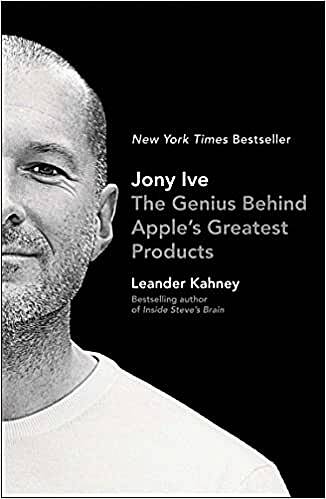
My highlights from the book:
1. I just wanted a sound bite, but he launched into a passionate, twenty-minute soliloquy about his latest work. I could barely get a word in edgewise. He couldn't help himself: Design is his passion.
2. The thing is, it's very easy to be different, but very difficult to be better.
3. It becomes about consensus, and that's why you rarely see the spark of genius.
4. "There was something about respecting the work," Jony said, "the idea that actually it was important-and if you didn't take the time to do it, why should anybody else?”
5. What something should be was always the starting point for his designs.
6. He had the ability to remove, or ignore, how any product currently is, or how an engineer might say it must be.
7. But as he sat there thinking about returning to England with his wife, Jobs said something that gave him pause. Jobs told the group that Apple would be returning to its roots. "I remember very clearly Steve announcing that our goal is not just to make money but to make great products," Jony later recalled. "The decisions you make based on that philosophy are fundamentally different from the ones we had been making at Apple."
8. Jony Ive was very serious about his work. He had a ferocious intensity about it.
9. Grinyer was amazed to find the apartment filled with more than a hundred foam model prototypes of Jony's project, his design discipline on display. When most students might build half a dozen models, Jony had built a hundred. I'd never seen anything like it: the sheer focus to get it perfect.
10. Rather than competing with commodity PC makers like Dell, Compaq and Gateway, why not make only first-class products with high margins so that Apple could continue to develop even better first-class products? The company could make much bigger profits from selling a $3,000 machine rather than a $500 machine, even if they sold fewer of them. Why not, then, just concentrate on making the best $3,000 machines around?
11. Jobs aimed at making innovative products again, but he didn't want to compete in the broader market for personal computers, which was dominated by companies making generic machines for Microsoft's Windows operating system. These companies competed on price, not features or ease of use. Jobs figured theirs was a race to the bottom.
12. He takes big chances, instead of an evolutionary approach to design —and if they had focus grouped Ive's designs, they wouldn't have been a success.
13. Apple had branched out into a wide-ranging product portfolio, selling everything from printers, scanners and monitors to Newton handhelds. To Jobs, this made no sense. "What I found when I got here was a zillion and one products," Jobs later said. "It was amazing. And I started to ask people, now why would I recommend a 3400 over a 4400? When should somebody jump up to a 6500, but not a 7300? And after three weeks, I couldn't figure this out. If I couldn't figure this out how could our customers figure this out?”
14. Because of the industry's obsession with absolutes, there has been a tendency to ignore product attributes that are difficult to measure or talk about. In that sense, the industry has missed out on the more emotive, less tangible product attributes. But to me, that is why I bought an Apple computer in the first place.
15. In releasing new products, companies tended to add more bells and whistles, not take them away, but here Jony was saying the opposite.
16. What Steve Jobs brought to the table was no compromise. He focused on what the product was supposed to be.
17. Jony was amazed at the speed with which Jobs gave his approval to the new colors. "In most places that decision would have taken months. Steve did it in a half hour."
18. Innovation is rarely about a big idea; more usually it's about a series of small ideas brought together in a new and better way. Jony's fanatical drive for excellence is most evident in the stuff beyond the obvious; the stuff you perhaps don't notice that much, but which makes a difference to how you interact with the product, how you feel about it.
19. Jony explained his thinking this way. The computer industry "is an industry that has become incredibly conservative from a design perspective. It is an industry where there is an obsession about product attributes that you can measure empirically. How fast is it? How big is the hard drive? How fast is the CD? That is a very comfortable space to compete in because you can say eight is better than six." But Jony offered a key insight: "It's also very inhuman and very cold."
20. Netbooks accounted for 20 percent of the laptop market. But Apple never seriously considered making one. "Netbooks aren't better than anything," Steve Jobs said at the time. "They're just cheap laptops."
Learn from history's greatest entrepreneurs by listening to Founders. Every week I read a biography of an entrepreneur and find ideas you can use in your work.